Carlos Sanson Jr. es un actor australiano y defensor de la salud mental que desea ayudar a las personas a comprender cómo apoyar a amigos y familiares con trastornos por abuso de sustancias.
Sanson dio apoyo recientemente a una persona muy querida para él que ha sufrido una adicción durante años. Aunque considera que no le corresponde compartir la historia de esa persona, sí desea compartir lo que ha aprendido sobre cómo dar apoyo a los seres queridos sin facilitarles las cosas.
“Es difícil saber cómo y cuándo ayudar, especialmente cuando las personas parecen estar completamente bien”, dijo Sanson.

El moverse diariamente, ya sea entrenando como boxeador competitivo o dando un paseo junto al mar, es una parte fundamental de la rutina de autocuidado de Sanson. A Sanson (en la foto de arriba) le apasiona ayudar a las personas a dar prioridad a su salud mental.
Una cosa fundamental que aprendió es que no podía “arreglar” la adicción de otra persona.
Un amigo que tuvo una experiencia similar ayudó a Sanson a comprender que la adicción de un ser querido no es su responsabilidad. Se sintió como un gran avance cuando se dio cuenta de que su papel era simplemente escuchar y crear un espacio seguro para la comunicación.
“Si hubiera tenido esta mentalidad desde el principio, podría haber reducido el estrés que afectó mi salud gravemente”, comentó.
Sanson tuvo recientemente la oportunidad de hablar sobre la adicción con Sarah Leitz, MD, y líder nacional de Kaiser Permanente en reducción de daños y medicina de la adicción.
Estas son algunas de sus respuestas a las preguntas de Sanson.
¿La adicción es una enfermedad?
Sí, la adicción es una enfermedad médica tratable y continua. Implica interacciones complejas entre el entorno de una persona y su genética, su cerebro y sus experiencias.
¿La adicción se puede heredar? ¿Cómo afectan nuestros genes a la adicción?
La interacción entre sus genes y su entorno puede influir en el desarrollo de un trastorno por abuso de sustancias.
Si tiene un familiar con un trastorno por abuso de sustancias, usted también tiene más probabilidades de desarrollarlo.
Otros factores son los momentos difíciles durante la infancia, la exposición temprana a sustancias adictivas y las afecciones físicas o mentales continuas.
¿Las experiencias tempranas, como los traumas infantiles, contribuyen a la adicción?
Las investigaciones muestran que las personas que atraviesan momentos difíciles durante la infancia son más propensas a tener problemas de salud, incluidos los trastornos por abuso de sustancias. Estos desafíos en la infancia se denominan experiencias adversas en la infancia (Adverse Childhood Experiences, ACE).
Cuando damos apoyo a las familias y comunidades y les brindamos habilidades, recursos, educación y estrategias de afrontamiento, podemos detectar los trastornos por abuso de sustancias en una etapa temprana e incluso prevenir que ocurran.
Así es como podemos ayudar a romper el ciclo antes de que derive en problemas de salud graves. Queremos asegurarnos de que las sustancias nunca se consideren la única respuesta a los retos de la vida.
¿Qué importancia tiene el lenguaje que usamos cuando hablamos sobre la adicción?
Las palabras que usamos son muy importantes. Pueden ayudar a las personas a comprender que un trastorno por abuso de sustancias no es un defecto de carácter. Es una afección médica que se puede tratar.
Las palabras adecuadas pueden ayudar a las personas a sentir que hay esperanza. Y un lenguaje respetuoso puede ayudar a reducir el estigma que sienten las personas. Muchas personas no buscan ayuda porque se sienten avergonzadas.
Por ejemplo, si decimos que alguien está “limpio”, eso implica que antes estaba “sucio”. Es mejor decir que está “en recuperación”.
Y en lugar de llamar a alguien “drogadicto” o “adicto”, puede ser más útil decir, “alguien que consume una sustancia”.
Al usar un lenguaje más compasivo, podemos describir la situación de la persona con precisión, sin juzgarla.
¿Cómo establecemos límites saludables sin dejar de dar apoyo?
Es importante crear y mantener límites con consecuencias claras. Esto ayuda a las personas a comprender cómo su abuso de sustancias les afecta a ellos mismos y a los demás.
Aunque es natural querer ayudar o presionar para que se produzca un cambio, la recuperación duradera rara vez es el resultado de poner ultimátums o ejercer presión externa. Por lo general, comienza cuando alguien siente que tiene apoyo y está listo para cambiar.
¿Cómo podemos dar prioridad al autocuidado mientras damos apoyo a un ser querido?
Tener un familiar con un trastorno por abuso de sustancias puede ser difícil. Lo primero que debe recordar es cuidarse a sí mismo. Esto significa dormir lo suficiente, hacer ejercicio con regularidad y hacer cosas que le gusten.
Hablar con un terapeuta también puede ayudar. Los terapeutas pueden enseñarle habilidades y estrategias para establecer límites. Los grupos de apoyo como Al-Anon también pueden ayudar a las familias y a los seres queridos.
Recuerde que la persona con la adicción debe esforzarse por encontrar su recuperación.
Obtenga más información sobre la atención de la salud mental y las adicciones en Kaiser Permanente.
